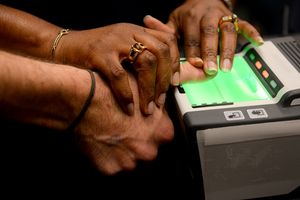
Jeddah, Jan 19: Fingerprinting will be a must for all male and female expatriates for renewal and issuance of iqama from Rabi Al-Thani 1 (Jan. 21).
Sources at the Passport Department said that the fingerprint of male and female expatriates will be necessary for the renewal of residence permits (iqama); the fingerprint will be recorded only once and kept in the automated central system (ACS) along with the other data about expatriates.
Most of the expatriates currently have their fingerprints stored in the ACS.
The application of the fingerprint system for expatriates and their families started several years ago and the prints were taken at the ports of entry or special centers set up to record fingerprints in cities.
The Passport Department urged all employers and expatriate family heads to verify that their fingerprints and those of their families are present in the records of the ACS and those whose fingerprints are missing should take steps to take their fingerprints again.
No fingerprints are needed in the case of those who are not yet 15 years old. The passport offices in all provinces have made special arrangements to take fingerprints of women expatriates at all its branches.





Comments
Add new comment